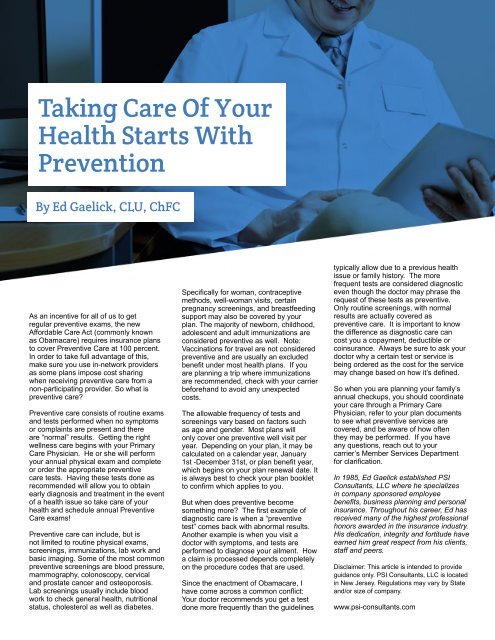24 Seven September2018
Change Your Attitude… Change Your Life: 24/seven is a monthly, free magazine for personal growth, professional development, and self-empowerment. The approach is holistic, incorporating mind, body, soul, and spirit. As philosopher Francis Bacon said, “Knowledge is power.” Use this information to live your best life now.
Change Your Attitude… Change Your Life: 24/seven is a monthly, free magazine for personal growth, professional development, and self-empowerment. The approach is holistic, incorporating mind, body, soul, and spirit. As philosopher Francis Bacon said, “Knowledge is power.” Use this information to live your best life now.
Create successful ePaper yourself
Turn your PDF publications into a flip-book with our unique Google optimized e-Paper software.
Taking Care Of Your<br />
Health Starts With<br />
Prevention<br />
By Ed Gaelick, CLU, ChFC<br />
As an incentive for all of us to get<br />
regular preventive exams, the new<br />
Affordable Care Act (commonly known<br />
as Obamacare) requires insurance plans<br />
to cover Preventive Care at 100 percent.<br />
In order to take full advantage of this,<br />
make sure you use in-network providers<br />
as some plans impose cost sharing<br />
when receiving preventive care from a<br />
non-participating provider. So what is<br />
preventive care?<br />
Preventive care consists of routine exams<br />
and tests performed when no symptoms<br />
or complaints are present and there<br />
are “normal” results. Getting the right<br />
wellness care begins with your Primary<br />
Care Physician. He or she will perform<br />
your annual physical exam and complete<br />
or order the appropriate preventive<br />
care tests. Having these tests done as<br />
recommended will allow you to obtain<br />
early diagnosis and treatment in the event<br />
of a health issue so take care of your<br />
health and schedule annual Preventive<br />
Care exams!<br />
Preventive care can include, but is<br />
not limited to routine physical exams,<br />
screenings, immunizations, lab work and<br />
basic imaging. Some of the most common<br />
preventive screenings are blood pressure,<br />
mammography, colonoscopy, cervical<br />
and prostate cancer and osteoporosis.<br />
Lab screenings usually include blood<br />
work to check general health, nutritional<br />
status, cholesterol as well as diabetes.<br />
Specifically for woman, contraceptive<br />
methods, well-woman visits, certain<br />
pregnancy screenings, and breastfeeding<br />
support may also be covered by your<br />
plan. The majority of newborn, childhood,<br />
adolescent and adult immunizations are<br />
considered preventive as well. Note:<br />
Vaccinations for travel are not considered<br />
preventive and are usually an excluded<br />
benefit under most health plans. If you<br />
are planning a trip where immunizations<br />
are recommended, check with your carrier<br />
beforehand to avoid any unexpected<br />
costs.<br />
The allowable frequency of tests and<br />
screenings vary based on factors such<br />
as age and gender. Most plans will<br />
only cover one preventive well visit per<br />
year. Depending on your plan, it may be<br />
calculated on a calendar year, January<br />
1st -December 31st, or plan benefit year,<br />
which begins on your plan renewal date. It<br />
is always best to check your plan booklet<br />
to confirm which applies to you.<br />
But when does preventive become<br />
something more? The first example of<br />
diagnostic care is when a “preventive<br />
test” comes back with abnormal results.<br />
Another example is when you visit a<br />
doctor with symptoms, and tests are<br />
performed to diagnose your ailment. How<br />
a claim is processed depends completely<br />
on the procedure codes that are used.<br />
Since the enactment of Obamacare, I<br />
have come across a common conflict:<br />
Your doctor recommends you get a test<br />
done more frequently than the guidelines<br />
typically allow due to a previous health<br />
issue or family history. The more<br />
frequent tests are considered diagnostic<br />
even though the doctor may phrase the<br />
request of these tests as preventive.<br />
Only routine screenings, with normal<br />
results are actually covered as<br />
preventive care. It is important to know<br />
the difference as diagnostic care can<br />
cost you a copayment, deductible or<br />
coinsurance. Always be sure to ask your<br />
doctor why a certain test or service is<br />
being ordered as the cost for the service<br />
may change based on how it’s defined.<br />
So when you are planning your family’s<br />
annual checkups, you should coordinate<br />
your care through a Primary Care<br />
Physician, refer to your plan documents<br />
to see what preventive services are<br />
covered, and be aware of how often<br />
they may be performed. If you have<br />
any questions, reach out to your<br />
carrier’s Member Services Department<br />
for clarification.<br />
In 1985, Ed Gaelick established PSI<br />
Consultants, LLC where he specializes<br />
in company sponsored employee<br />
benefits, business planning and personal<br />
insurance. Throughout his career, Ed has<br />
received many of the highest professional<br />
honors awarded in the insurance industry.<br />
His dedication, integrity and fortitude have<br />
earned him great respect from his clients,<br />
staff and peers.<br />
Disclaimer: This article is intended to provide<br />
guidance only. PSI Consultants, LLC is located<br />
in New Jersey. Regulations may vary by State<br />
and/or size of company.<br />
www.psi-consultants.com


















